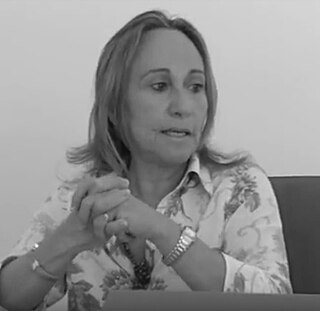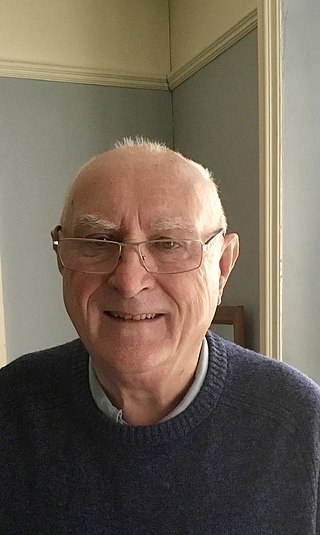Related Research Articles

A metaphor is a figure of speech that, for rhetorical effect, directly refers to one thing by mentioning another. It may provide clarity or identify hidden similarities between two different ideas. Metaphors are often compared with other types of figurative language, such as antithesis, hyperbole, metonymy, and simile. One of the most commonly cited examples of a metaphor in English literature comes from the "All the world's a stage" monologue from As You Like It:
Cognitive science is the scientific study either of mind or of intelligence . Practically every formal introduction to cognitive science stresses that it is a highly interdisciplinary research area in which psychology, neuroscience, linguistics, philosophy, computer science, anthropology, and biology are its principal specialized or applied branches. Therefore, we may distinguish cognitive studies of either human or animal brains, the mind and the brain.
Applied linguistics is an interdisciplinary field which identifies, investigates, and offers solutions to language-related real-life problems. Some of the academic fields related to applied linguistics are education, psychology, communication research, information science, natural language processing, anthropology, and sociology.
Communicative language teaching (CLT), or the communicative approach (CA) , is an approach to language teaching that emphasizes interaction as both the means and the ultimate goal of study.
Rod Ellis is a Kenneth W. Mildenberger Prize-winning British linguist. He is currently a research professor in the School of Education, at Curtin University in Perth, Australia. He is also a professor at Anaheim University, where he serves as the Vice president of academic affairs. Ellis is a visiting professor at Shanghai International Studies University as part of China’s Chang Jiang Scholars Program and an emeritus professor of the University of Auckland. He has also been elected as a fellow of the Royal Society of New Zealand.
The British Association for Applied Linguistics (BAAL) is a learned society, based in the UK, which provides a forum for people interested in language and applied linguistics.
Stefan Th. Gries is (full) professor of linguistics in the Department of Linguistics at the University of California, Santa Barbara (UCSB), Honorary Liebig-Professor of the Justus-Liebig-Universität Giessen, and since 1 April 2018 also Chair of English Linguistics at the Justus-Liebig-Universität Giessen.
Norbert Schmitt is an American applied linguist and Emeritus Professor of Applied Linguistics at the University of Nottingham in the United Kingdom. He is known for his work on second-language vocabulary acquisition and second-language vocabulary teaching. He has published numerous books and papers on vocabulary acquisition.
Merrill Swain is a Canadian applied linguist whose research has focused on second language acquisition (SLA). Some of her most notable contributions to SLA research include the Output Hypothesis and her research related to immersion education. Swain is a Professor Emerita at the Ontario Institute for Studies in Education (OISE) at the University of Toronto. Swain is also known for her work with Michael Canale on communicative competence. Swain was the president of the American Association for Applied Linguistics in 1998. She received her PhD in psychology at the University of California. Swain has co-supervised 64 PhD students.
The International Association of Applied Linguistics, or AILA, was formed in 1964 as an association of various national organizations for applied linguistics. AILA has more than 8,000 members in more than 35 different applied linguistics associations around the world. AILA continues to grow, working with existing and emerging regional networks, such as AILA East Asia, AILA Europe, AILA Arabia, and AILA Latin America. Its most high-profile activity is the World Congress of Applied Linguistics, which takes place once every three years. It also has two publications, AILA News, a newsletter, and the AILA Review, an academic journal.
Elena Semino is an Italian-born British linguist whose research involves stylistics and metaphor theory. Focusing on figurative language in a range of poetic and prose works, most recently she has worked on topics from the domains of medical humanities and health communication. Her projects use corpus linguistic methods as well as qualitative analysis.

Marjolijn Verspoor is a Dutch linguist. She is a professor of English language and English as a second language at the University of Groningen, Netherlands. She is known for her work on Complex Dynamic Systems Theory and the application of dynamical systems theory to study second language development. Her interest is also in second language writing.

Diane Larsen-Freeman is an American linguist. She is currently a Professor Emerita in Education and in Linguistics at the University of Michigan in Ann Arbor, Michigan. An applied linguist, known for her work in second language acquisition, English as a second or foreign language, language teaching methods, teacher education, and English grammar, she is renowned for her work on the complex/dynamic systems approach to second language development.

Rosa María Manchón Ruiz is a Spanish linguist. She is currently a professor of applied linguistics at the University of Murcia, Spain. Her research focuses on second language acquisition and second language writing. She was the editor of the Journal of Second Language Writing between 2008 and 2014.
Martin Bygate is a British linguist. He is currently an honorary professor at the Department of Linguistics and English Language of Lancaster University, United Kingdom. His research focuses on applied linguistics with a special focus on tandem language learning, pedagogical grammar and task-based language learning.

Keith Johnson is a British linguist. He is currently an emeritus professor at the Department of Linguistics and English Language of Lancaster University, United Kingdom. His research focuses on applied linguistics with a special focus on second language acquisition and language teaching.
Alison Mackey is a linguist who specializes in applied linguistics, second language acquisition and research methodology. She is currently a professor in the Department of Linguistics at Georgetown University. Her research focuses on applied linguistics and research methods.
Susan Gass is an American Kenneth W. Mildenberger Prize-winner linguist. She is currently a professor emerita, retired from the Department of Linguistics, Languages, and Cultures at Michigan State University. Her research focuses on applied linguistics with a special focus on second language learning, corrective feedback, and task-based language learning. She graduated in 1961 from Kingswood School Cranbrook.
Louise Jane Ravelli is an Australian linguist. She is a professor in the School of the Arts and Media at the University of New South Wales, Australia. Her research expertise includes multimodal communication, museum communication, discourse analysis, and systemic functional grammar, using the frameworks of Systemic Functional Linguistics, Social Semiotics, and Multimodal Discourse Analysis.
Patsy M. Lightbown is an American applied linguist whose research focuses on the teaching and acquisition of second and/or foreign languages in a classroom context. Her theories of second language acquisition earned her the SPEAQ Award for "contributions which have had an impact on the entire English teaching community in Quebec". She served in the United States Peace Corps in Niger, West Africa from 1965 to 1967. In her more than forty years in the field she has taught at multiple universities across the United States, Australia and Canada. She holds the title of Distinguished Professor Emerita at Concordia University in Montreal, Quebec. She has written seven published books and has been featured in many book chapters and refereed journals. She currently works as an independent consultant, editor, researcher and writing in second language acquisition and learning.
References
- ↑ "British Library EThOS: Individual differences in second language learning : towards an identification of the strategy preferences and language learning strengths of L2 students with holistic and/or imager cognitive styles". Ethos.bl.uk. Retrieved 2016-11-21.
- ↑ "Professor Jeannette Littlemore - Department of English Language and Linguistics". birmingham.ac.uk. Retrieved 2021-03-20.
- ↑ "International recognition". Birmingham.ac.uk. 2016-05-17. Retrieved 2016-11-21.
- ↑ "Research Bulletin (Vol.2, Issue no.4)". Ouhk.edu.hk. Retrieved 2016-11-21.
- ↑ "International Advisory Board | Metaphor Lab Amsterdam". Metaphorlab.org. Retrieved 2016-11-21.
- ↑ "E M M A – Exploring Multimodal Metaphor in Advertising". Multimodalmetaphor.com. Retrieved 2016-11-21.
- ↑ Beate Hampe, review in Cognitive Linguistics. 26(3) pp. 549–560
- ↑ Jules Winchester (2015), review in Discourse & Society 26(1) pp. 139-140.
- ↑ "Metaphor and Metonymy in Different Environments: A Review of Alice Deignan's, Jeannette Littlemore's and Elena Semino's 'Figurative Language, Genre and Register'" (PDF). ESP Today. 3 (2): 130–134. 2015.
- ↑ Adisa Imamović. "Review in Exell: Exploration in English Language and Linguistics" (PDF). pp. 187–192.
- ↑ Jingyang Jiang, "Novel applications of cognitive approaches in second language acquisition," Review of Applied Cognitive Linguistics in Second Language Learning and Teaching. AILA Review, Volume 23. Amsterdam 2010, in: PRAGMATICS.REVIEWS.2013.1.1